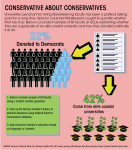A popular talking point in conservative circles is that universities are left-leaning ivory towers.
They might be right – but not for the reasons they think.
Contrary to what fiery conservative pundits would have you believe, it’s not because of a vast left-wing conspiracy to brainwash the youth. Instead, it’s probably a product of issues with UCLA’s hiring practices.
In fact, these practices could be responsible for the seeming lack of ideological and geographical diversity within the ranks of the faculty. The data is unambiguous: UCLA’s faculty is composed overwhelmingly of liberal-leaning academics educated at prestigious coastal universities.
This apparent lack of ideological diversity within UCLA’s faculty can inhibit students’ understanding of academic subjects, especially given that political homogeneity might prevent them from being exposed to a full range of academic perspectives.
It should be concerning that a wide variety of intellectual principles – from economic preconceptions to synthesis of current political issues – are formed in the confines of classrooms increasingly unlikely to be headed by conservative professors. Moreover, a lack of geographic diversity among faculty can give rise to intellectual sameness and narrow the kind of research they conduct. After all, hiring practices that shut out candidates from noncoastal areas also shut out candidates’ unique intellectual perspectives.
This shortage of ideological and geographic diversity within UCLA’s faculty can be addressed by reassessing the university’s internal hiring practices and making a concerted effort to reach out to aspiring conservative academics, especially those educated outside elite coastal universities.
Again, this shortage of conservative and noncoastal academics is more than an empty political talking point. Analysis of a random sample of 50 UCLA faculty members selected from a 2017 report suggests 22% of professors have overtly liberal ideological leanings and that a little less than half were educated at Ivy Leagues and other prestigious private universities. Political donations made by faculty members were used as proxies for liberal or conservative leanings, and the academic background of each faculty member in the random sample was determined through examination of their LinkedIn profiles or faculty biographies.
Graduates of these elite universities seem to be overrepresented within UCLA’s faculty, especially given that only about 20 of the country’s thousands of research universities constitute this cream of the academic crop.
Furthermore, a quarter of a 50-person random sample might not seem to be a large proportion, but it should be noted that only 0.48% of the United States’ population regularly donates $200 or more to political campaigns, as that 22% of UCLA professors had. Clearly, UCLA professors are both more politically active and more liberal than the population at large.
Of course, there are certainly many confounding factors, but one data point stands out: none of the faculty members in the sample had donated to Republicans.
Gary Orfield, professor of education, law, political science and urban planning, said this could be a result of the lack of conservative-leaning professors in certain fields.
“The truth is that in many fields, especially in the social sciences and humanities, a relatively small group of leading scholars are conservatives,” Orfield said.
This marked preponderance of liberal, coastal-educated professors might well stem from unintentionally skewed hiring practices. In turn, when hiring practices are so skewed as to advantage candidates from certain ideological and geographic backgrounds, there is bound to be a degree of intellectual uniformity.
“The field of economics is a great example of this phenomenon,” said Gabriel Rossman, a sociology professor. “Doctoral students in economics are almost always hired from a set group of schools that emphasize (mainstream) economic perspectives.”
Rossman said this tendency to hire aspiring academics from a select group of universities effectively prevents doctoral students specializing in alternative academic doctrines, like the Austrian School in economics, from landing teaching positions.
Ideological diversity, on the other hand, forces students to engage with unfamiliar perspectives and reevaluate their beliefs. It also encompasses the inclusion of a wide variety of approaches to scholarship and intellectual analysis, which in effect shows students there’s more than one way to understand the world around them.
“Nobody seriously disputes that the vast majority of scholars in the social sciences and humanities have liberal political leanings,” Rossman said. “Sometimes, it is true that this situation can produce a sort of intellectual groupthink.”
Any attempt to rectify the lack of intellectual diversity at UCLA must start with a thorough examination of university hiring practices. Students will continue to face the deleterious effects of ideological homogeneity as long as the university advantages certain types of faculty candidates.
And while some might argue the overrepresentation of professors from prestigious coastal universities might merely be a function of the lack of acceptable candidates elsewhere, plenty of academics hail from colleges and universities outside of coastal regions. It seems ridiculous to assume that Ivy Leagues and their brethren are the country’s only repositories of academic talent.
UCLA’s hiring practices are far from the stuff of conspiracy theories. They do, however, have momentous consequences for the quality of Bruin education.

Probably it should start in the sort of students that are being awarded Ph.Ds. It is well known that progressive professors tend to make it impossible for conservative grad students to get a doctorate. We hear nowadays that potential faculty hires are being quizzed on what they have done to create “diversity.” Perhaps intellectual diversity is what they should be required to support in order to get hired, tenured, and promoted.
Well said. I’m ashamed of my alma mater.